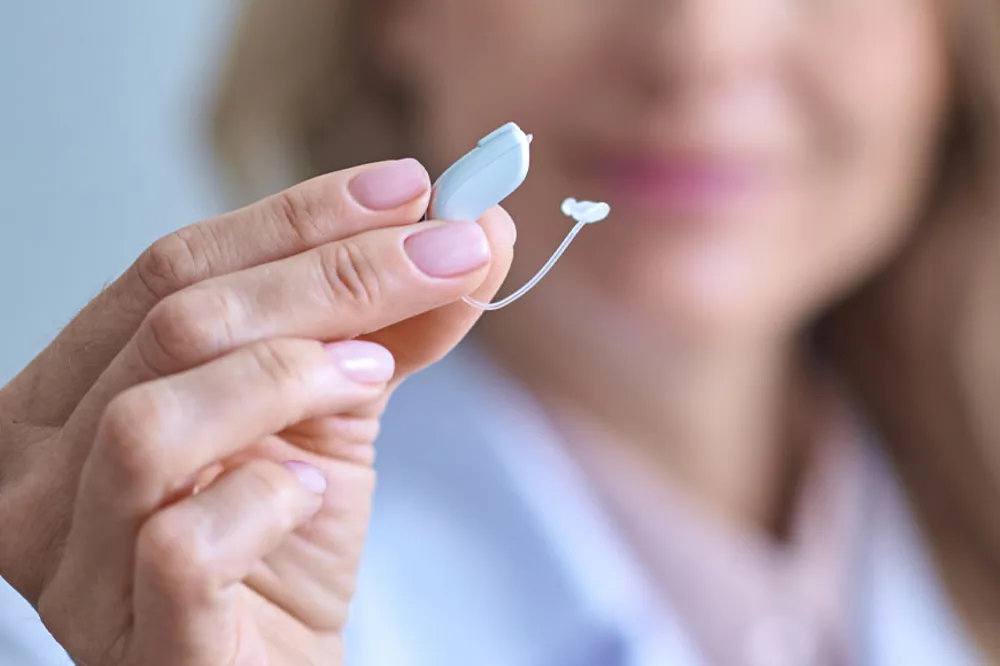Hearing Health’s Watershed Moment
January 18, 2023

Millions who suffer hearing loss will benefit from easier access to over-the-counter hearing aids.
A CTA executive board meeting planted the seed for over-the-counter (OTC) hearing aids, as CTA President and CEO Gary Shapiro remembers it.
At that fateful meeting, Voxx International Corp. President and CEO Pat Lavelle asked why Americans couldn’t buy hearing aids as they buy their reading glasses — readily, and without a prescription, at a local pharmacy or chain store. Doing so would require an act of Congress.
The four-figure cost of prescription hearing aids and audiologist visits generally make this life-saving technology unaffordable and inaccessible to many Americans. As a result, as many as 80% of adults who suffer mild hearing loss also miss the words, sounds and songs most hearing people take for granted. OTC hearing aids address the problem.
While it took nearly a decade to disrupt the hearing aid market’s status quo, recent efforts resulted in a new category of OTC hearing aids, which will benefit tens of millions of consumers who experience mild to moderate hearing loss.
New Standards
The Food and Drug Administration’s (FDA) final rule authorizing OTC hearing aids marked the culmination of years-long advocacy by CTA and our members. The approval draws in part from CTA’s voluntary OTC hearing aid industry standards developed over the last decade, which describe minimum performance criteria.
Similar to standards that govern prescription hearing aids, OTC industry standards detail performance criteria (Category 1 parameters), which must be measured and fall within an acceptable range, including:
- Frequency response bandwidth
- Frequency response smoothness
- Maximum acoustic output
- Distortion-control limits and self-generated noise levels
Work will continue to ensure CTA standards evolve and inform FDA cooperation in the space. “Getting anything through Congress is difficult, but the great news is that we succeeded, and these devices are now available in stores and online,” Shapiro says. “We’re excited about the momentum behind new market entrants, as well as legacy hearing aid companies. The new competition is healthy, and so many companies are innovating to bring new products to market that will benefit those with mild to moderate hearing loss.”
This new category of hearing devices will also likely spur discussion about the importance of hearing health. CTA recently launched efforts with member companies and partners to highlight resources for those who think they may be losing their hearing, helping Americans better understand the severity of their hearing deficit and identify options for treatment.
Increased awareness of hearing health will help millions of families, especially in light of growing evidence of the link between hearing loss and dementia and mental health challenges. Continued innovation in the hearables space will be on display at CES 2023. Work will continue to ensure CTA standards evolve and inform FDA cooperation in the space.
Learn More
Watch John R. Luna, CEO of Nuheara, discuss the rise of digital health and OTC hearing aid technology, the groundswell of bipartisan momentum behind the 2017 bill’s passage, and why standards are so important for wearable technology.
See CTA Board member and former standards committee chair Poppy Crum, CTO NextSense, Inc., discuss CTA’s role in making OTC hearing aids a reality, why OTC hearing aids are life-changing for millions of Americans, and how the FDA’s new rule will affect innovation in the hearing space. Crum also details NextSense’s use of data collected via earbuds to derive insights about brain health, sleep, seizures and more.
What’s Available?
CTA member brands offering over-the-counter hearing aids include:
- Bose
- HP
- Jabra/GN
- Lucid Hearing
- Nuheara
- Sony
Latest and Greatest
OTC hearing aids featuring app-based controls allow users to adjust device settings to meet their current environment, as well as determine solutions that will work best for them without having to wait for follow-up appointments.
“These OTC devices improve outcomes for Americans with mild to moderate hearing loss and their families, and they’ll cost a fraction of prescription hearing aids fitted by audiologists and hearing care professionals,” says John R. Luna, CEO of Nuheara.
Join our community of innovators and shape the future of technology.



